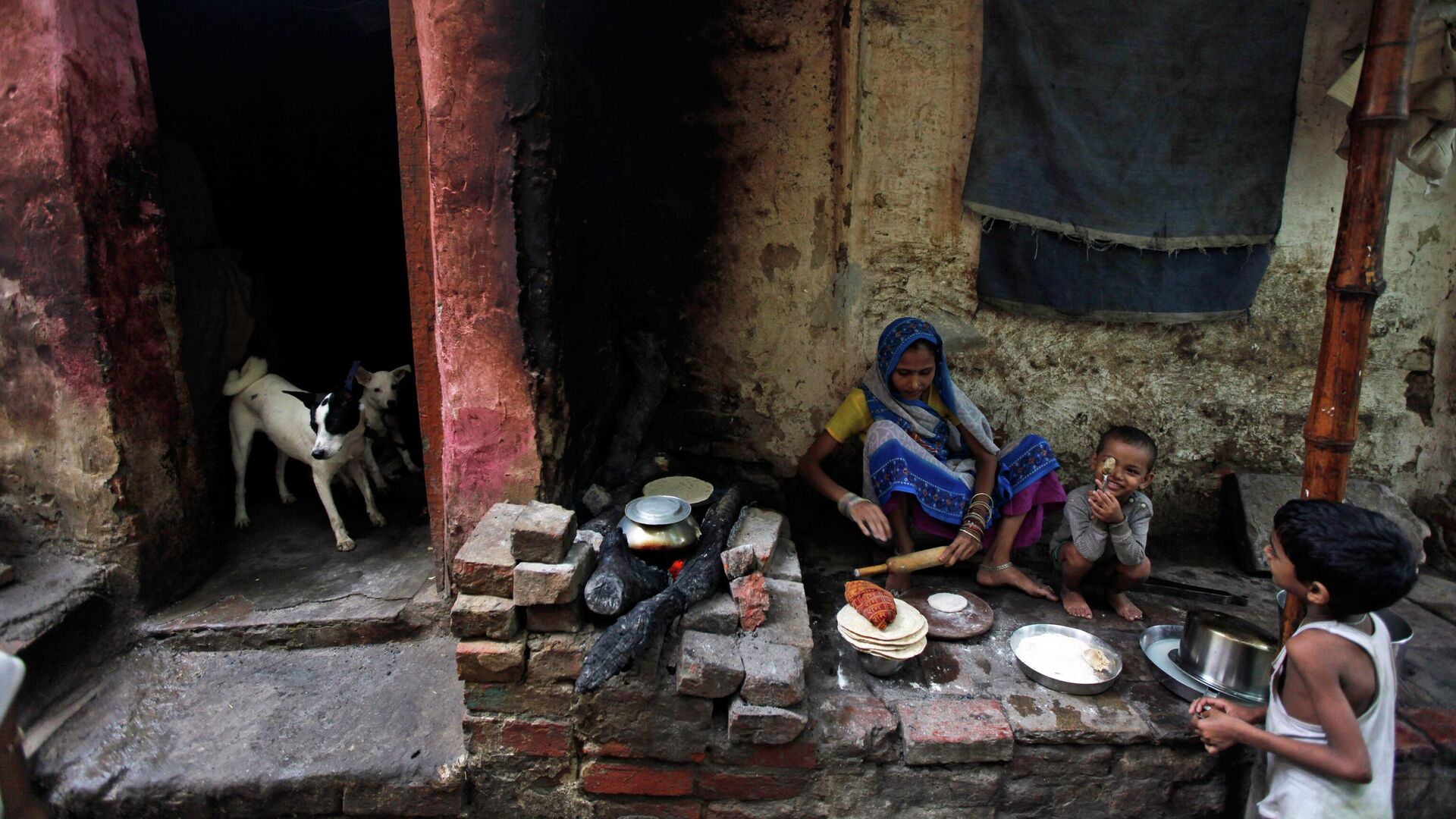https://sputnikglobe.com/20220920/india-facing-tough-decision-over-fate-of-worlds-largest-free-food-program-1101005613.html
India Facing Tough Decision Over Fate of World's Largest Free Food Program
India Facing Tough Decision Over Fate of World's Largest Free Food Program
Sputnik International
The free food ration program was launched in April 2020 during the first nationwide COVID-19 lockdown. Under it, five kilos of wheat or rice and one of grains... 20.09.2022, Sputnik International
2022-09-20T16:20+0000
2022-09-20T16:20+0000
2023-03-05T11:22+0000
india
narendra modi
narendra modi
inflation
food
food
food
food
scheme
https://cdn1.img.sputnikglobe.com/img/07e6/09/14/1101012728_0:320:3072:2048_1920x0_80_0_0_01bdac232c8105cae929e833b6773517.jpg
Prime Minister Narendra Modi is set to take a hard decision on whether to extend the world's largest free food program, known as PMGKAY, which is set to expire this month.In June, the Department of Excise and Expenditure advised the government not to prolong PMGKAY, citing financial and food security concerns. However, the federal government extended it to September 2022 nonetheless.The PMGKAY has not only supported the most vulnerable people during the pandemic but also helped the ruling BJP to retain many Indian states, opined Sameer Chougaonkar, a senior journalist and political analyst."In the Uttar Pradesh state election that was held in February, during poll campaigning Narendra Modi and even [the] BJP Party cited the schemes and how their government helped the marginalised. Despite not liking the candidate put up by the BJP in their electoral constituency, a lot of people voted for the BJP, saying [that] since they had enjoyed Modi government's free food, it's time to return the favor," Chougaonkar said."Now, in markets, food (grain) is not costly because everyone knows that the government is supporting at least 800 million people. Imagine the moment when the scheme will be rolled back, and hoarders and black-market will start raising the price," he stressed.In a note to the central government, the Department of Expenditure said the scheme was "beyond the need at a non-pandemic time"."Running the food scheme for another six months would drain another INR 700 billion ($8.7 million) from the budget, narrowing the fiscal deficit to 6.4 percent of gross domestic product for 2022-2023.Anirban Bhattacharya, Team Lead for National Finance at the Centre for Financial Accountability, said, "Ration distributed to the marginalised during the lockdown till April is about INR 3.4 trillion ($42 Billion). More than double the amount could have been generated with a 2 percent wealth tax on the top 1 percent."
Sputnik International
feedback@sputniknews.com
+74956456601
MIA „Rosiya Segodnya“
2022
Deexa Khanduri
https://cdn1.img.sputnikglobe.com/img/07e4/0c/1e/1081607388_0:0:961:960_100x100_80_0_0_e9e931b8c1e18fb41f3074e2145d7a3a.jpg
Deexa Khanduri
https://cdn1.img.sputnikglobe.com/img/07e4/0c/1e/1081607388_0:0:961:960_100x100_80_0_0_e9e931b8c1e18fb41f3074e2145d7a3a.jpg
News
en_EN
Sputnik International
feedback@sputniknews.com
+74956456601
MIA „Rosiya Segodnya“
Sputnik International
feedback@sputniknews.com
+74956456601
MIA „Rosiya Segodnya“
Deexa Khanduri
https://cdn1.img.sputnikglobe.com/img/07e4/0c/1e/1081607388_0:0:961:960_100x100_80_0_0_e9e931b8c1e18fb41f3074e2145d7a3a.jpg
india, narendra modi, narendra modi, inflation, food, food, food, food, scheme
india, narendra modi, narendra modi, inflation, food, food, food, food, scheme
India Facing Tough Decision Over Fate of World's Largest Free Food Program
16:20 GMT 20.09.2022 (Updated: 11:22 GMT 05.03.2023) Deexa Khanduri
Sputnik correspondent
The free food ration program was launched in April 2020 during the first nationwide COVID-19 lockdown. Under it, five kilos of wheat or rice and one of grains are provided to citizens free of charge. The Finance Ministry is against extending the program as it adds pressure to the budget deficit. The final call will be taken by the prime minister.
Prime Minister Narendra Modi is set to take a hard decision on whether to extend the world's largest free food program, known as PMGKAY, which is set to expire this month.
Under the program, the federal government distributed food to 810 million citizens every month since April 2020, in addition to the existing subsidized ration scheme under the National Food Security Act. Meanwhile, PMGKAY costs the government about INR 1.5 trillion ($18.8 billion) annually.
In June, the Department of Excise and Expenditure advised the government not to prolong PMGKAY, citing financial and food security concerns. However, the federal government extended it to September 2022 nonetheless.
Experts told Sputnik that it would not be easy for the government to roll back the scheme.
The PMGKAY has not only supported the most vulnerable people during the pandemic but also helped the ruling BJP to retain many Indian states, opined Sameer Chougaonkar, a senior journalist and political analyst.
"In the Uttar Pradesh state election that was held in February, during poll campaigning Narendra Modi and even [the] BJP Party cited the schemes and how their government helped the marginalised. Despite not liking the candidate put up by the BJP in their electoral constituency, a lot of people voted for the BJP, saying [that] since they had enjoyed Modi government's free food, it's time to return the favor," Chougaonkar said.
Sachin Jain, a Right to Food Campaign activist, told Sputnik: "This scheme is now an essential requirement for millions of families to combat hunger. The burden of COVID-19 has disproportionately shifted more on [to the] vulnerable."
"Now, in markets, food (grain) is not costly because everyone knows that the government is supporting at least 800 million people. Imagine the moment when the scheme will be rolled back, and hoarders and black-market will start raising the price," he stressed.
In a note to the central government, the Department of Expenditure said the scheme was "beyond the need at a non-pandemic time".
"Running the food scheme for another six months would drain another INR 700 billion ($8.7 million) from the budget, narrowing the fiscal deficit to 6.4 percent of gross domestic product for 2022-2023.
Anirban Bhattacharya, Team Lead for National Finance at the Centre for Financial Accountability, said, "Ration distributed to the marginalised during the lockdown till April is about INR 3.4 trillion ($42 Billion). More than double the amount could have been generated with a 2 percent wealth tax on the top 1 percent."
"The problem arose when we started seeing welfare schemes as a burden. We have to change the perception, and the question should be: are we raising enough revenues for the vulnerable?" he added.




